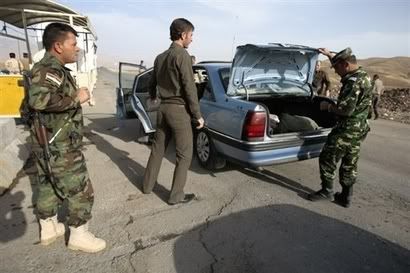If that is the influence of Iraq, perhaps it is not too good. Because safety is a big issue in England, all the sockets have a little label which says when they have been checked. The bathroom has stickers warning that the water is hot (hurray, that’s what I wanted) and that wet surfaces might be slippery. Safety means something completely different there than in Iraq and Kurdistan.
Here you learn how to live with danger. In the beginning, I would not go to Kirkuk because people around me said it was dangerous. Then I found they did not go there themselves, so they hardly knew the situation. I went, and after a few times I even stopped wearing the scarf that was supposed to make me blend in. Now, when my stringer suggests I wear a scarf, I ask him why. And if he does not have a reply that convinces me, I will not do it.
Because if you know where the dangers are in Kirkuk, you can try to avoid some of them. Do not travel in the mornings, as most attacks take place in the mornings. Stay in the mixed and Kurdish areas, as they are considered the most safe. Yet it is hard to avoid passing the police headquarters in the city center, next to the reconstructed library, which needs new paint again after the umpteenth bomb attack on the police next door. Many destinations can only be reached by crossing through the center.
When you talk to Europeans, they mention the bomb attacks in Erbil and Sulaymaniya of 2006 and 2008. I tell them that is past, Kurdistan is safe. I prefer not to mention the many times the checkpoints have stopped cars with explosives. Because for us in Kurdistan, the fact that the security police is able to find them, is reassuring. For people from outside, the sole fact that explosives are found is scary. They will wonder how much is not found. We all know that the security police finds weapons and explosives in homes. But we cannot allow ourselves to worry too much and we are happy they are found in time. We have to live with the risk.
 And the more days pass into weeks and months without anything happening, the more we are convinced that Kurdistan is safe. Which it is - if you are used to checkpoints with armed guards, demonstrations under the guard of heavily armed men, gun shots in the night because of neighbors quarreling, a police action somewhere or because of shots in the air at some celebration, and guns as a normal occurrence in the streets. Like I saw in Chamchamal recently even a boy no older than fourteen walking around with a gun slung over his shoulder.
And the more days pass into weeks and months without anything happening, the more we are convinced that Kurdistan is safe. Which it is - if you are used to checkpoints with armed guards, demonstrations under the guard of heavily armed men, gun shots in the night because of neighbors quarreling, a police action somewhere or because of shots in the air at some celebration, and guns as a normal occurrence in the streets. Like I saw in Chamchamal recently even a boy no older than fourteen walking around with a gun slung over his shoulder.We are used to that, and we even see it as one of the reasons why Kurdistan is safe. The armed guys are making sure nothing happens.
Perhaps because we are so used to taking the risk, we do not even wonder about pushing away the safety catch in the electricity socket. Or simply even putting wires straight into the socket, without a plug at all. What risk is that, compared to the all the other ones that we live with?
This is an edited edition of a column published in Kurdish in the daily newspaper Kurdistani Nwe
No comments:
Post a Comment